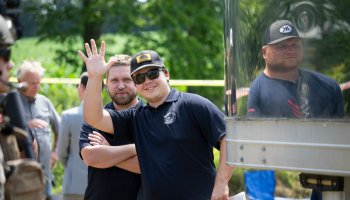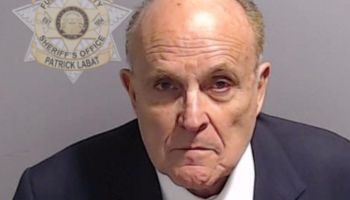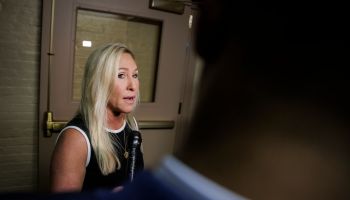When Trayvon Martin was shot and killed, I refused to read about it. I didn’t follow up online and I didn’t watch any TV coverage about it. I ignored Twitter streams with the hashtag #trayvonmartin.
It wasn’t because I didn’t care. It was because I cared too much. I didn’t look because I was in denial. Trayvon’s photos look like many of the photos of my son. Smiling and playing football, in the house with his family — it was heartbreaking, far too heartbreaking for me to digest when it first happened. It wasn’t until the middle of the week when a co-worker asked me what I thought about the situation that I really started to have to soak it in. It brought up a lot of emotions, a lot of pain. This is the Emmet Till of my son’s generation. This is a terrorizing time for Black fathers.
RELATED:
There Are Trayvon Martins All Over The World
Follow NewsOne’s full Trayvon Martin coverage here.
My start in activism began around 1989, what many call the “Golden Age of Hip-Hop.” This was because at that time, many argued that rap music was at its peak in regards to making political and social commentary, and much of it was about race. A child was shot by a San Francisco police officer, and it was ruled a justifiable homicide by the courts. I still think I have the newspaper clipping somewhere. At that time I was 19, real Black and real mad. I started rolling with old school real Black Panthers (not these new dudes who claim to be the “New Black Panthers”). Shortly after, I converted to Islam. When Spike Lee’s “Malcolm X” dropped, I sat between Alice Walker and Joe Marshall from Street Soldiers Radio. Rodney King was sitting in the front row.
That whole time of my life is one beautiful blur. I was frontlines at all the protests and rallies. I remember running up in Oakland City Hall meetings hundred deep with Boots from the Coup. I wrote for the Black Panther paper “Commemorator” and studied Black history like my life depended on it, because it did.
But then I got married to a beautiful Black woman I had known most of my life. We had our first son a few years ago. The pregnancy was tough on her body. The doctors were not sure she would make it. When he was born, his head was real long because it kept bumping against her cervix. I never prayed so hard in my life. By God’s grace, they both made it.
‘LIKE’ NewsOne’s FB Page To Stay Up On Black News From Around The World
After my son’s birth, my activism on the block dropped off significantly. I felt like once you had children your duty was to raise them, and that by raising them well, you are helping the ‘hood. My wife and I had two daughters after that, and we are now a pretty tight knit family. Today I don’t involve myself with the political and social activism that’s out there today. I believe in nonviolence and do what I can to practice and promote those ideas on my own terms.
The night Barack Obama was elected, we were piled up on our bed in awe. Right after his election, we started hearing about how now we were in “Post-Racial America,” a term I never bought into, mostly because I never knew what it meant. Racism was still here, just not as overt and not as violent. But it still has its violent moments. Right now is one of them.
I’m close to my son and his sisters. My wife and I have been married happily 16 years now. The doctor said he’s gonna be six foot nine. Even if they are wrong, he’s certainly going to be taller than I stand at six foot three. The kid’s got great grades, has knowledge of self, and is into sports.
The lyrics of Talib Kweli’s “The Proud” have replayed in my head so many times:
“I want him livin right, livin good, respect the rules/He’s five years old and he still thinkin’ cops is cool/How do I break the news that when he gets some size /He’ll be perceived as a threat or see the fear in they eyes/ It’s in they job description to terminate the threat/So 41 shots to the body is what he can expect/ The precedent is set, don’t matter if he follow the law/I know I’ll give my son pride and make him swallow it all (damn!)”
My father had to have “the talk” with me. When I was about 13, he taught me specifically how to talk and move when in the presence of police. To say what you have on you and then say, “I’m reaching into the glove compartment with my right hand,” and then do it slowly. I’ve had cops put guns to my eye socket for “illegal U-turns.” I’ve been accused of everything from purse snatching to gang banging to shoplifting and none of it was ever true. The only truth was that in any city in America they are always looking for “a six-foot-tall Black male between 180-200 lbs.” I’m always the usual suspect. Today my son and all Black boys his age have inherited the curse of the usual suspect.
Despite me having family members on the police force, those lyrics are true. From what I hear and see, Trayvon Martin was very much like my son. Yet none of the great qualities about his character could keep him from being murdered by someone who could not see past their fear of Black males. Then Geraldo Rivera had the audacity to blame it on hoodie Trayvon was wearing.
One of my co-workers, who is well meaning, said, “Make sure you tell your son not to wear hoodies no more.” I understood it, and my internal fear as a Black father made me want to tell him that as well. As I pondered it back at home, I realized it would never work. There was never a time when a Black man could dress well enough not to be justifiably killed on North American soil. In a hoodie, I’m “too gangsta,” and in a suit, I’m just “uppity” and need to remember my place. If I told my son to stop wearing hoodies, I’d be enabling the fear that White America has of Black men. I can’t do that.
No dress code, no manner of speech, no amount in my back account can stop those who live in fear and hatred of my kind from pulling a trigger.
I asked my son about how he felt about the idea that he not wear hoodies. He said, “I feel like it’s not fair. They can’t tell me how to dress.”
Keep in mind, he can hardly wear red or blue at all already. I scrutinize every hat and T-shirt that comes in the house. My wife and I have made the core of his clothing gang neutral colors (white, black, gray, tan, brown, green). We know that not just police, but other kids from the block, are sizing him up. His dress code is framed around having swag but not standing out as an easy target for anybody. Most White and Asian parents don’t have these kinds of concerns. But the hats many of your sons wear can get mine killed depending on where he finds himself.
At night, I sometimes have dark visions of my son falling victim to violence before Trayvon. Since the incident, the sadness is constantly haunting me. I have talked with my son at length about this situation. I make sure he stays in tune with the developments of the case. I have him reading books about racism so that he can learn how things can play out socially and politically and what his options might be in any given situation. When he was real young I used to drive around playing Black Star’s “Little Brother” on repeat.
I hoped the words would sink into his head as he drank from his bottle. I play the song now for me, just to have hope that what I’m trying to teach him will work. Now having given him some of the best tools at my disposal, I can only pray that justice in the courts sees its day soon and that the peace Trayvon Martin’s parents deserve can arrive in their hearts.
RELATED:
There Are Trayvon Martins All Over The World
Follow NewsOne’s full Trayvon Martin coverage here.















